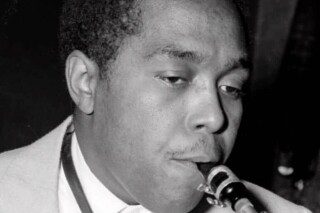Today in History: March 12, jazz legend Charlie ‘Bird’ Parker dies at 34

FILE - In this May 8, 1949 file photo, Jazz great Charlie Parker performs in Paris. (AP Photo/Jean-Jacques Levy, File)
Today in History:
On March 12, 1955, legendary jazz saxophonist Charlie “Bird” Parker died in New York at age 34.
On this date:
In 1864, Lt. Gen. Ulysses S. Grant assumed command as General-in-Chief of the Union armies in the Civil War.
In 1912, the Girl Scouts of the USA had its beginnings as Juliette Gordon Low of Savannah, Georgia, founded the first American troop of the Girl Guides.
In 1925, Chinese revolutionary leader Sun Yat-sen died in Beijing.
In 1947, President Harry S. Truman announced what became known as the “Truman Doctrine” to help Greece and Turkey resist Communism.
In 1971, Hafez Assad was confirmed as president of Syria in a referendum.
In 1980, a Chicago jury found John Wayne Gacy Jr. guilty of the murders of 33 men and boys. (The next day, Gacy was sentenced to death; he was executed in May 1994.)
In 1987, the musical play “Les Miserables” opened on Broadway.
In 1994, the Church of England ordained its first women priests.
In 2003, Elizabeth Smart, the 15-year-old girl who vanished from her bedroom nine months earlier, was found alive in a Salt Lake City suburb with two drifters, Brian David Mitchell and Wanda Barzee. (Mitchell is serving a life sentence; Barzee was released from prison in September 2018.)
In 2009, disgraced financier Bernard Madoff pleaded guilty in New York to pulling off perhaps the biggest swindle in Wall Street history; he would be sentenced to 150 years behind bars. (Madoff died in prison in April 2021.)
In 2011, fifteen passengers were killed when a tour bus returning from a Connecticut casino scraped along a guard rail on the outskirts of New York City, tipped on its side and slammed into a pole that sheared it nearly end to end.
In 2012, Greece implemented the biggest debt write-down in history, swapping the bulk of its privately held bonds with new ones worth less than half their original value.
In 2013, black smoke poured from the Sistine Chapel chimney, signaling that cardinals had failed on their first vote of the papal conclave to choose a new leader of the Catholic Church to succeed Benedict XVI.
In 2017, a bus plowed into people taking part in an early morning street festival in Haiti, killing at least 34 of them.
In 2018, Republicans on the House Intelligence Committee said they’d completed a draft report concluding that there was no collusion or coordination between Donald Trump’s presidential campaign and Russia.
In 2021, the city of Minneapolis agreed to pay $27 million to settle a civil lawsuit from George Floyd’s family over the Black man’s death in police custody.
In 2020, as the coronavirus crisis deepened in the U.S., the stock market had its biggest drop since the Black Monday crash of 1987, the NCAA canceled its basketball tournaments after earlier planning to play in empty arenas and the NHL joined the NBA in suspending play.
In 2022, Russian forces pounding the Ukrainian port city of Mariupol shelled a mosque that was sheltering more than 80 people, including children.
In 2023, “Everything, Everywhere All at Once” won seven Oscars, including best picture and three of the four acting awards.
